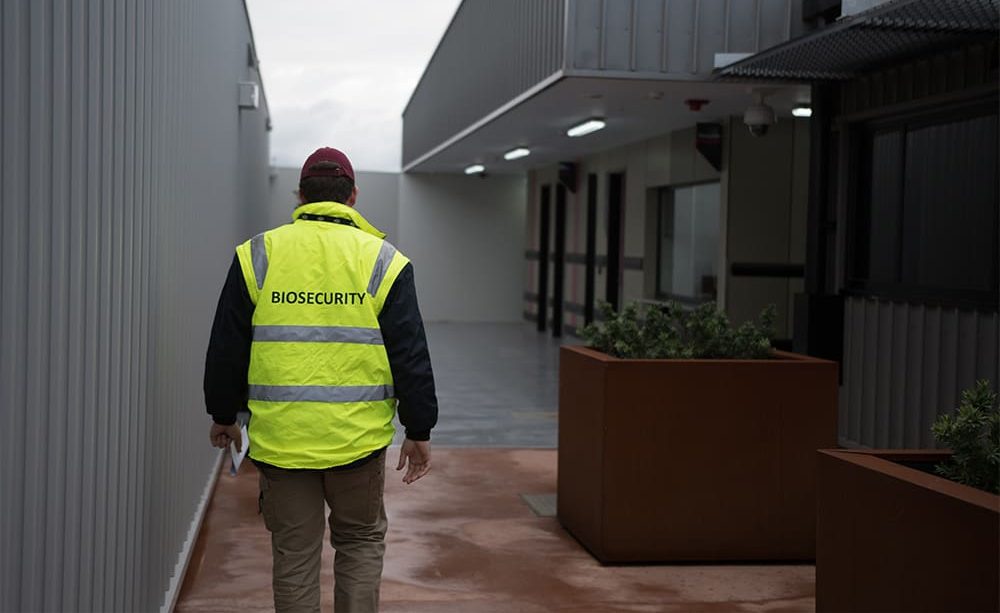
A proposed biosecurity levy has come under fire from 50 Australia producer groups. Photo: DAFF
THE FEDERAL Government has received a joint letter from 50 Australian agricultural producer representative groups voicing strong opposition to the proposed 10 percent biosecurity tax due to be introduced July 1 this year.
The groups represent producers across a range of sectors, including grains, livestock, horticulture, dairy, and forestry.
The letter is addressed to Prime Minister Anthony Albanese, and a copy has been sent to Treasurer Jim Chalmers and to Agriculture Minister Murray Watt.
Sheep Producers Australia and WoolProducers Australia are among the 50 groups backing the raising of a Biosecurity Fighting Fund to fight the proposed tax’s implementation.
WoolProducers Australia chief executive officer Jo Hall said producers, processors and exporters all along the agriculture, food and fibre supply chains are strongly opposed to this proposed tax being introduced.
Ms Hall said recent commentary about cost-of-living pressures and pricing transparency had highlighted the fact farmers are also doing it tough, whilst the seasonal pressures are relentless.
“Farmers are facing ever increasing pressures to produce food that’s affordable, and the highest quality in the world, whilst others rake-in record profits,” Ms Hall said.
“This move by the Federal Government will only amplify these production pressures by hitting farmers with another tax that’s nothing more than double dipping and cost-shifting on biosecurity.”
Grain Producers Australia chair Barry Large said Australian producers take biosecurity seriously on their farms every single day.
“That’s why we already pay significant amounts to fund biosecurity protections directly within our own businesses.

GPA chair and WA grower Barry Large.
“We also pay directly through other compulsory industry levies that raise hundreds of millions of dollars, including biosecurity levies,” he said.
“We’ve been calling for increased funding and protections to make the system better and fairer for producers with increased accountability and shared responsibility, but this proposal in its current form is grossly unfair and fundamentally flawed and needs to be reversed.”
The letter to the Prime Minister says that Meat and Livestock Australia’s biosecurity investment was more than $26 million in 2023 and the Grains Research and Development Corporation’s outlay over the past six years totals about $220 million, including $42.3M in 2022-23.
The letter states:
The principles of this policy proposal do not accord with the recent Productivity Commission report into levies, which assesses the policy against well-understood criteria. The independent Productivity Commission analysis also supports industry’s view that this is a tax. It is proposed to be non-hypothecated and carries multiple risks and consequences. In particular, the producer groups represented here share grave concerns about the flawed approach and inequity of this new tax proposal. Primarily, it unfairly punishes those already doing the right thing (ie levy-paying producers are being forced to pay more taxes), whilst others continue to avoid making any contribution to biosecurity costs and shared responsibilities.
Mr Ranford said producer representatives are subsequently calling for an immediate reversal of the government’s flawed “one-size-fits-all” tax proposal to prevent these unintended consequences.
“This decision would help start the process of repairing the damage that’s already been inflicted on trust and confidence in the existing levy system, and key partnerships with producers,” Mr Ranford said.
“It will also allow a more considered approach to accommodate levy payers’ concerns.”
The joint letter urges Treasury “to conduct proper detailed economic analysis/modelling” of the proposal, including providing the criteria used to label agricultural producers as the only beneficiaries of the biosecurity system and not others who also benefit from strong biosecurity and food security.
Individual producers and others are urged to write to their local MPs and the Minister, to reinforce their opposition to the proposal, and call for its immediate reversal, and can access the campaign page that includes a template letter on the GPA website.


HAVE YOUR SAY